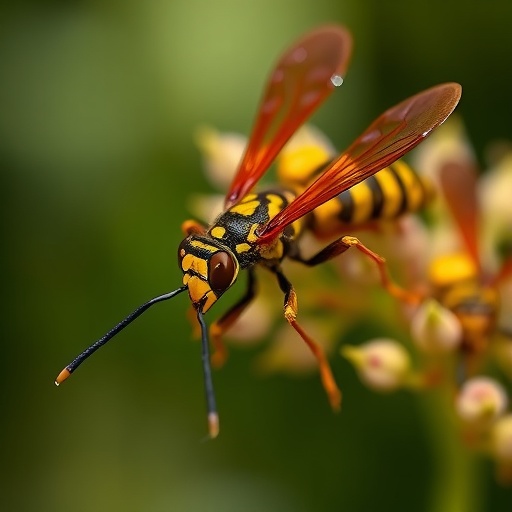Recent research has unveiled fascinating insights into the genetic and biochemical composition of the Polistes canadensis wasp, commonly known for its unique social behavior and ecological significance. Conducted in Bahia, Brazil, the study provides a thorough examination of these underexplored insects through advanced genetic and High-Performance Liquid Chromatography with Diode-Array Detection (HPLC–DAD) techniques. This investigation not only broadens our understanding of the wasp’s biology but also indicates how environmental factors influence its genetic diversity and chemical profile.
Polistes canadensis is part of the Vespidae family and is particularly noted for its intricate social structure. These wasps are known to build paper-like nests and engage in complex behaviors concerning territory and cooperation among colony members. Understanding these wasps’ genetics and chemical makeup may shed light on behavioral adaptations and survival strategies. Insights gleaned from this study may ultimately have ecological conservation implications, providing a glimpse into the health of the ecosystems in which they reside.
The application of genetic analysis methods in this research highlights the importance of contemporary biotechnology in entomological studies. Molecular techniques allow scientists to decipher the evolutionary relationships and potential adaptive functions of the genes present in Polistes canadensis. Such genetic insights contribute to a broader understanding of the wasp’s adaptability to varying environmental challenges, particularly in changes triggered by climate variability.
Furthermore, the use of HPLC-DAD as a central analytical technique marks a significant advancement in assessing the biochemical compounds present in these wasps. This high-resolution method enables researchers to separate, identify, and quantify complex mixtures of substances within the wasp. The resulting chemical profile may include various metabolites that are crucial for the wasp’s survival, such as those involved in defense mechanisms, communication, and reproductive strategies.
The findings from Bahia, Brazil, bring to light the potential variations in Polistes canadensis populations influenced by geographic and environmental differences. The state of Bahia, with its lush biodiversity and unique habitats, serves as an ideal backdrop for investigating how local ecological variables can impact the genetic makeup of these wasps. Researchers anticipate that these differences could point to localized evolutionary pressures, giving rise to phenotypic variations that underscore the adaptability of this species.
Moreover, the research contributes to a better understanding of the ecological roles played by Polistes canadensis within its habitat. Wasps in general are vital for pollination, pest control, and nutrient recycling within ecosystems. By characterizing the genetic and chemical pathways of this wasp, researchers aim to elucidate the broader ecological interactions and dependencies that define these roles. This understanding can inform conservation strategies aimed at preserving both the wasps themselves and the environmental dynamics they influence.
The research team employed advanced statistical analysis to interpret their genetic findings, enabling them to construct a detailed map of genetic diversity among populations. This work is pivotal because genetic diversity is often directly correlated with the resilience of species against diseases and environmental fluctuations. Therefore, documenting the levels of genetic variation among Polistes canadensis wasps may indicate the potential risks they face from changing climates or habitat loss.
Additionally, understanding the chemical composition of Polistes canadensis can yield insights that extend beyond mere species identification. For instance, specific compounds found within these wasps may offer potential medicinal properties or agricultural applications. The study’s biochemical analysis uncovers substances that could lead to new avenues of research in pharmacology, particularly in the synthesis of natural pesticides or bioactive compounds.
Furthermore, insights gained from this research may contribute to educational initiatives aimed at raising awareness about the importance of wasps in ecological systems. Often misunderstood as mere pests, wasps like Polistes canadensis play essential roles in maintaining the balance of their habitats. This newfound knowledge has the potential to shift public perception, encouraging coexistence and appreciation for these industrious insects.
In the global context, studies such as this underscore the importance of insect biodiversity and its conservation. The genetic and biochemical data derived from Polistes canadensis add to the growing body of literature stressing the urgent need to safeguard insect populations worldwide, which are facing unprecedented threats from habitat destruction, pollution, and climate change. Establishing protective measures for these critical species is essential not only for their survival but also for the overall health of ecosystems.
As the scientific community continues to publish findings on the implications of such research, it paves the way for further investigations into similar or related species. Strengthening our understanding of Polistes canadensis can serve as a model for studying other wasps and insect families facing similar ecological pressures. In doing so, researchers hope to inspire future generations of scientists to explore and safeguard our planet’s biodiversity.
In summary, the research on Polistes canadensis in Bahia, Brazil offers a comprehensive view into the genetic and chemical uniqueness of this fascinating wasp. Through rigorous genetic scrutiny and biochemical assessment, the study not only reveals critical information about the species but also emphasizes its ecological significance. Such findings are essential for promoting conservation efforts and raising awareness about the vital role of insects within our ecosystems.
Subject of Research: Polistes canadensis wasp genetic and biochemical analysis
Article Title: Genetic and HPLC–DAD analyses of the Polistes canadensis wasp (Linnaeus, 1758) collected in the state of Bahia, Brazil.
Article References:
Assunção, A., Nolasco, M., Reis, I.M.A. et al. Genetic and HPLC–DAD analyses of the Polistes canadensis wasp (Linnaeus, 1758) collected in the state of Bahia, Brazil. Sci Nat 112, 79 (2025). https://doi.org/10.1007/s00114-025-02035-6
Image Credits: AI Generated
DOI: https://doi.org/10.1007/s00114-025-02035-6
Keywords: Polistes canadensis, genetic analysis, HPLC-DAD, biodiversity, ecosystem conservation




